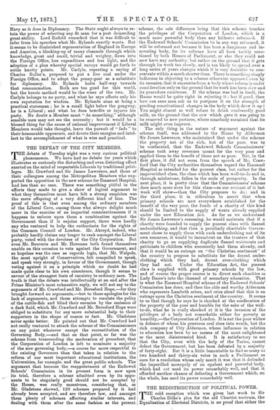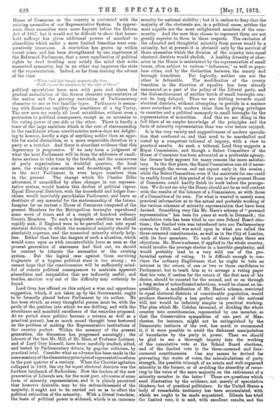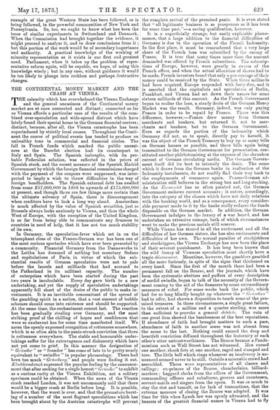THE REDISTRIBUTION OF POLITICAL POWER.
THE cold reception which was given last week to Sir Charles Dilke's plea for the old Chartist nostrum, the Equalisation of Electoral Districts, is no proof that either the
House of Commons or the country is contented with the existing anomalies of our Representative System. In appear- ance, those anomalies were more flagrant before the Reform Act of 1867, but it would not be difficult to show that house- hold suffrage has given additional powers of mischief to absurdities which under a more limited franchise were com- paratively innocuous. A conviction has grown up within recent years, and has been strengthened by our experience of the Reformed Parliament, that a mere equalisation of political rights by dead levelling may satisfy the mind that seeks numerical symmetry, but in no other way improves the state of the representation. Indeed, so far from desiring the advent of the time
"When each fair burgh, numerically free.
Shall chooie its members by the rule of three,"
political speculators have seen with pain and alarm the gradual assimilation of the diverse elements representative of the nation and the growing restriction of Parliamentary character to one or two familiar types. Parliament is assum- ing with disastrous rapidity the semblance of a big Vestry, The new men are nearly all local notabilities, without even a pretension to political consequence, except as an accession to the voting power of one side or the other. There is hardly a trace of the large ambition which is the root of statesmanship in the candidates whom constituencies now-a-days are delight- ing to honour, hardly a sign of anything nobler than an appe- tite for social distinction, or a more respectabls devotion to a party or a crotchet. And there is abundant evidence that this degeneracy is progressive. If we may form a judgment of what the next Parliament will be from the addresses of candi- dates anxious to take time by the forelock, and the manoeuvres of party organisations in doubtful quarters, the local men, the wealthy non-entities and do-nothings, will muster in the next Parliament in even larger numbers than in the present. The change which Sir Charles Dilke advocates, if unmodified by other changes in our represen- tative system, would hasten this decline of political vigour. Equal Electoral Districts, with the household and lodger fran- chises, would inevitably parochialise Parliament, and leave us destitute of any material for the statesmanship of the future. Imagine for an instant a House of Commons composed of the present Members for the Metropolitan boroughs reproduced some score of times, and of a couple of hundred ordinary County Members. To such a despicable condition we should rapidly sink, if England were to be parcelled out into equal electoral districts, in which the numerical majority should be -absolutely supreme, and the numerical minority utterly help- less. Rather than face the dangers of such a situation, which -would come upon us with uncontrollable force as soon as the Lord Grey has offered on this subject a wise and opportune suggestion, which, if not taken up by the Government, ought to be formally placed before Parliament by its author. He has been struck, as every thoughtful person must be, with the perils of the position into which we are drifting, and with the abundance and manifold excellence of the remedies proposed. At no period since politics became a science, as well as a practical pursuit, has so much sound thought been bestowed on the problem of making the Representative institutions of the country perfect. Within the memory of the present generation, the discussion has progressed amazingly ; the labours of the late Mr. Mill, of Mr. Hare, of Professor Lorimer, and of Lord Grey himself, have been carefully studied, sifted, and tested by Parliamentary debate, by popular criticism, by practical trial. Consider what an advance has been made in the mere mastery of the elementary principles of representative reform in the past quarter of a century. When the Chartist agitation collapsed in 1848, the cry for equal electoral districts was the furthest landmark of Radicalism. Now the leaders of the new generation of Liberals are, for the most part, advocates of some form of minority representation, and it is plainly perceived that however desirable may be the enfranchisement of the majority, it ought not to be carried out so its to effect the political extinction of the minority. With a liberal franchise, the basis of political power is widened, which is an immense security for national stability ; but it is useless to deny that the majority of the electorate are, in a political sense, neither the most capable nor the most enlightened members of the com- munity. And the men they choose to represent them are not greatly superior to them in these respects. The exclusion of the educated and thoughtful minority from power would be a calamity, but at present it is obviated only by the survival of those anomalies which the division of the country into equal electoral districts would abolish. A healthy diversity of char- acter in the House is maintained by the representation of small towns, often subject to various "influences," as well as popu- lous cities, and by the distinction between the county and borough franchises. But logically, neither one nor the other is defensible. The modification of the county franchise in the direction of equality has been already announced as a part of the policy of the Liberal party, and the disfranchisement of another batch of small boroughs can- not be long delayed. Thus we are drifting towards equal electoral districts, without attempting to provide in a manner more accordant with modern ideas than by giving privileges to counties and a political monopoly to small boroughs for the representation of minorities. And this we are doing in the full blaze of an ampler knowledge of the principles and the facts of minority representation than was ever before enjoyed. It is the very variety and suggestiveness of modern specula- tion that confound us, and that need to be marshalled and tested by a competent tribunal of inquiry, with a view to practical results. As such a tribunal, Lord Grey suggests a Royal Commission, and though a Select Committee of the House of Commons has been advocated as a preferable agency, the former body appears for many reasons the more satisfac- tory. In the first place, the Royal Commission can sit if neces- sary through the recess, and can report early in the session ; while the Select Committee, even if the materials for one could be readily found at this period of the year in the present House of Commons, could hardly finish its work before the proroga- tion. We do not see why the House should not be as well content with the results of the labours of a Commission, as with those of a Committee of its own. For what is wanted is merely some practical information as to the actual and probable working of the various schemes of minority representation that have been devised. Something very like Mr. Hare's scheme of "personal representation" has been for years at work in Denmark ; the cumulative vote has been tried in our own School Board elec- tions ; the limited vote was introduced into our Parliamentary system in 1868, and was acted upon in what are called the three-cornered constituencies, as well as in the City of London, with its four members. To each of these plans there are objections. Mr. Hare's scheme, if applied to the whole country, would involve the average elector in a horrible perplexity, and would probably lead to a very wild use of the pre- ferential system of voting. It is difficult enough to con- vince the ordinary Englishman that he ought to take an interest in the return of one or two or three candidates to Parliament, but to teach him so to arrange a voting paper that his vote, if useless for the return of the first man of his choice, should be counted for the second, and so on through a long series of subordinated selections, would be almost an im- possibility. A modification of Mr. Hare's scheme, restricted to equal electoral districts of considerable population, would produce theoretically a less perfect mirror of the national will, but would be infinitely simpler in practical working. The plan which Mr. Cobden favoured, of dividing the whole country into constituencies, represented by one member, so that the Conservative sympathies of one part of Man- chester, for instance, might not be extinguished by the Democratic instincts of the rest, has much to recommend it, if it were possible to avoid the dishonest manipulation of boundaries by the party in power. Then we should be glad to see a thorough inquiry into the working of the cumulative vote at the School Board elections, and of the limited vote in the three-cornered and four- cornered constituencies. Can any means be devised for preventing the waste of votes, the miscalculations of party strength, the possible triumph of an astute and well-organised minority in the former, or of avoiding the absurdity of recur- ring to the voice of the mere majority on the retirement of a minority member in the latter ? These are questions which need illustration by the evidence, not merely of speculative thinkers, but of practical politicians. In the United States a body of remarkable testimony has been accumulated, with which we ought to be made acquainted. Illinois has tried the limited vote, it is said, with excellent results, and the example of the great Western State has been followed, or is being followed, in the powerful communities of New York and Pennsylvania. So, too, we ought to know what has been the issue of similar experiments in Switzerland and Denmark. When the Commission had brought together the evidence, it might proceed to analyse it, and to draw conclusions from it ; but this portion of the work would be of secondary importance and authority. A practical knowledge of the working of minority representation as it exists is our first and greatest need. Parliament, when it takes up the problem of repre- sentative reform again, will be capable, we hope, of using this knowledge wisely ; but in any case, without guidance it would be too likely to plunge into reckless and perhaps destructive changes.




































 Previous page
Previous page